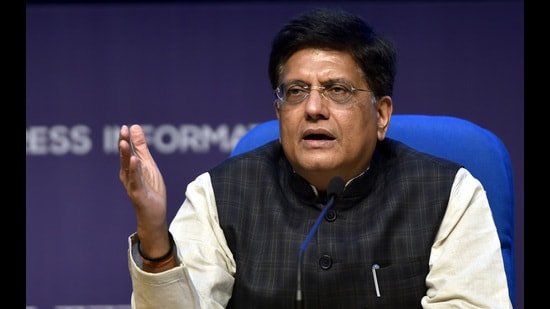Our Terms & Conditions | Our Privacy Policy
India to regain growth momentum in Q3: Goyal | Latest News India
New Delhi
Commerce and industry minister Piyush Goyal (Sanjeev Verma/HT PHOTO)
India’s economy will regain its higher growth momentum in the third quarter and achieve the estimated growth rate to remain the world’s fastest growing economy in 2024-25, commerce and industry minister Piyush Goyal said on Thursday.
Asked whether the Q2 GDP numbers worried him at the India Economic Conclave organised by the Times Network, the minister said: “Well, I think, governments don’t run ‘quarter se quarter tak’ [from one quarter to another],” and added that the blip was due to the “lag effect” of elections in the first quarter, which is now passé. He said during the election, policy making and implementations of projects slowed and there was a lag effect. But, “the initial numbers for this quarter, the 3rd quarter show a pick-up” , he added.
The official data released on November 29 showed GDP growth rate slowing down to a seven-quarter low at 5.4% in Q2 of FY25. While the Reserve Bank of India (RBI) on December 6 accepted that the real GDP in Q2 was “much lower than anticipated” it cited high frequency indicators to conclude that the slowdown in domestic economic activities had already bottomed out “aided by strong festive demand and a pick-up in rural activities”. The RBI on December 6 projected the real GDP growth for 2024-25 at 6.6%, with Q3 at 6.8% and Q4 at 7.2%.
“The way banks are now seeing traction back again, the way infrastructure spending has come back on track, I think, by the time we close the year in March, we’ll be back on track,” Goyal said. He said India will remain the fastest growing major economy of the world this fiscal year despite global challenges.
Addressing the same concern of moderate GDP growth in Q2 at a separate forum on Thursday, Chief Economic Advisor V Anantha Nageswaran said India is on track to achieving the projected 6.5-7% growth in 2024-25. An uncertain global economic environment is an enduring challenge for India and the country needs to double down on domestic efforts to navigate the uncertainties, he said at the CII’s Global Economic Policy Forum.
Nageswaran expressed optimism that private sector participation would rise in the next five years due to improved balance sheets and profitability. He enumerated certain critical drivers to sustain growth towards ‘Viksit Bharat’ by 2047 — generating productive employment, addressing the skill gap challenge, tapping into the full potential of the agriculture sector, enhancing India’s manufacturing through deregulation, managing India’s energy security and transition, balancing rural-urban development, continuing support to high-quality capital expenditure, and making ‘Make in India’ synonymous with high quality through innovation.
India is negotiating two FTAs with European entities — one with the United Kingdom (UK) and the other with the European Union (EU), a group of 27 countries. According to a commerce ministry statement issued on Thursday, Goyal interacted with ambassadors of a European Commission delegation — Austria, Belgium, Bulgaria, Czech Republic, Estonia, Italy, Ireland, Latvia, Lithuania, Malta, Poland, Portugal, Romania, Slovak Republic, Spain and Sweden – where they discussed trade-related matters. Both sides are aiming for “a balanced, ambitious, comprehensive and mutually beneficial FTA” and after nine rounds of intense engagement since 2022, there is a need for political directions to arrive at a commercially meaningful deal while understanding the sensitivities of each other, the statement said.
“The minister further underlined that any sustainability discussions must appreciate the principle of Common But, Differentiated Responsibility (CBDR) and implementation of such measures should take into account differing paths of development,” it said. India is against mixing sustainability issues with trade negotiations and it insists that countries must contribute towards sustainable development with assigned responsibilities based on their contribution to the problem in the first place underscoring “polluter pays” principle at a time when 27 European countries are forcing a carbon tax on imports from developing countries.
Images are for reference only.Images and contents gathered automatic from google or 3rd party sources.All rights on the images and contents are with their legal original owners.



Comments are closed.